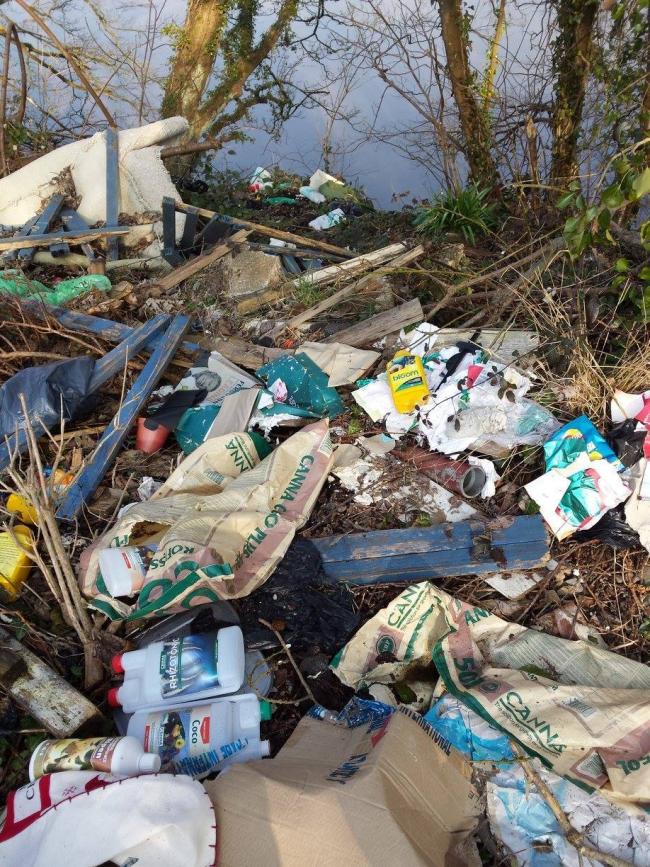
ONE subject brought up time and time again since the launch of our War on Litter is that of enforcement.
But with five local authorities to cover the answer isn’t straightforward.
Two councils in Gwent employ a private company to enforce litter fines, two use their own employees, while one doesn’t proactively patrol for littering offences at all.
Fixed penalty notices are set by the Welsh Government. The maximum fine is £150, but the local authorities themselves have the power to set the amount, within a range of £75 to £150.
Blaenau Gwent and Torfaen employ Kingdom Environmental Services to enforce litter fines.
A spokesman for Torfaen County Borough Council explained: “We pay for this service directly from our own budget and officers receive an hourly rate.

“This enables us to direct them as we wish, and there are no bonuses or incentives for them to issue fixed penalty notices to anyone who has not dropped litter.
Kingdom have also been policing litter in Blaenau Gwent since 2013.
But does hiring a private company to pick up after litterers, as opposed to council staffed teams, work? Let’s look at the numbers.
In the 2017-2018 financial year Torfaen council issued 369 fixed penalty notices for littering offences, up from just eight the year before.
In 2016-17 they received 404 reports of littering via their customer service team, but this fell after enforcement was introduced in 2017-18, to 313.
READ MORE: Community group in its 10th year rewards children for cleaning up the streets
Blaenau Gwent council revealed they issued 760 litter related fixed penalty notices in the 2017-18, down from 1,631 the year before.
A spokesman for Torfaen council confirmed they are considering developing an in-house litter enforcement team, while Blaenau Gwent council said that they would likely re-tender after Kingdom’s contract ends in September 2018.
Both Newport and Caerphilly County Borough use their own enforcement teams to issue on the spot fines.
While they weren’t specific, Newport City Council told the Argus their wardens issued more than 300 fixed penalty notices for litter offences in the last financial year, each carrying a fine of £75.
That figure is down on the 874 fixed penalty notices the year before, and a spokesman added they are considering whether to increase the fine to £100 per offence later this year.

Councillor Roger Jeavons, the council’s cabinet member for Streetscene said: “Despite limited resources, our officers are doing a sterling job, and we hope the public will take on board that they can help by disposing of waste in the proper manner.”
In Caerphilly County Borough, the council’s cleansing services are based on "routine patrols" by council employees.
A spokesman told the Argus that 152 fixed penalty notices were issued for litter offences last year, compared to 170 in 2016-17.
They added: “In addition to routine cleansing, the department responds reactively to complaints, service requests and priority public health and safety matters relating to litter."
But in Monmouthshire, the council have taken a very different approach.
READ MORE: The nursery where children play with real china tea sets destined for the rubbish tip
While fixed penalty notices can be issued by authorised officers from the council, there are no enforcement officers.
A spokesman explained: “Experience has shown that this is not cost effective given the rural nature of Monmouthshire.
“The number of penalty notices issued for April 1, 2017, to March 31, 2018, was three for dog fouling and zero for littering offences..
“The council has no plans to change the method of enforcement for the foreseeable future.”
The approach of the council also explains why the number of fixed penalty notices issued in Monmouthshire in the 2016-17 financial year was also zero.
The spokesman added: “The My Monmouthshire App, an online reporting mechanism has meant that the Environmental Health and Waste and Recycling Team obtain real time information and reports from the public which are followed up accordingly.
“We are also very fortunate in Monmouthshire to be supported by a large number of ‘community litter champions’ who are passionate about keeping the county litter free. Current evidence from the UK and beyond suggest that a combination of approaches, particularly those that focus on awareness raising are demonstrating effective results.”



Comments: Our rules
We want our comments to be a lively and valuable part of our community - a place where readers can debate and engage with the most important local issues. The ability to comment on our stories is a privilege, not a right, however, and that privilege may be withdrawn if it is abused or misused.
Please report any comments that break our rules.
Read the rules hereLast Updated:
Report this comment Cancel